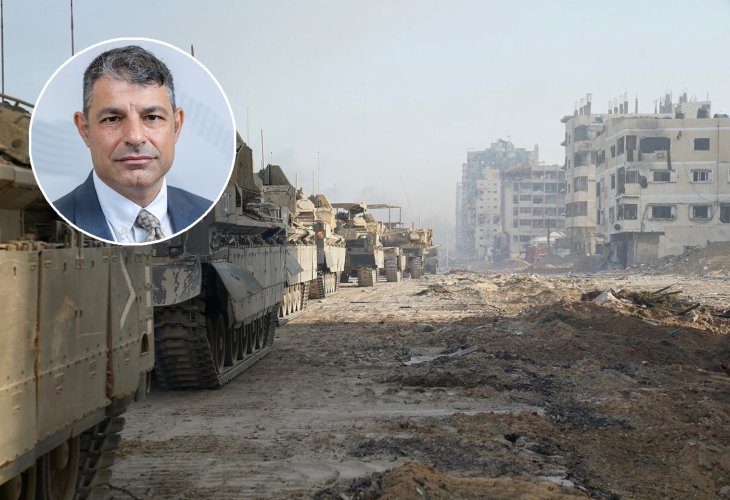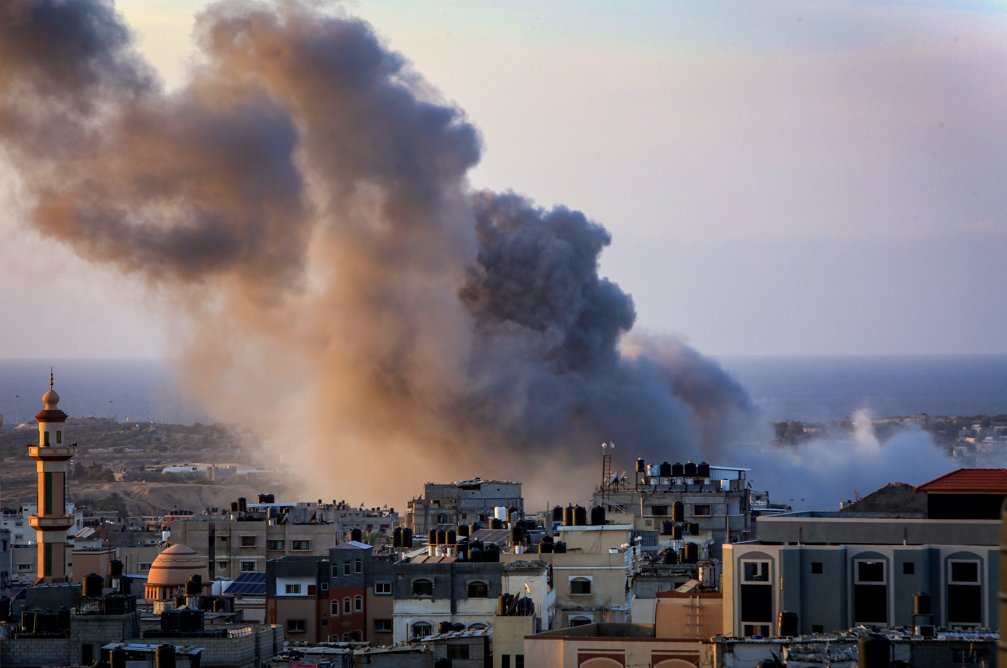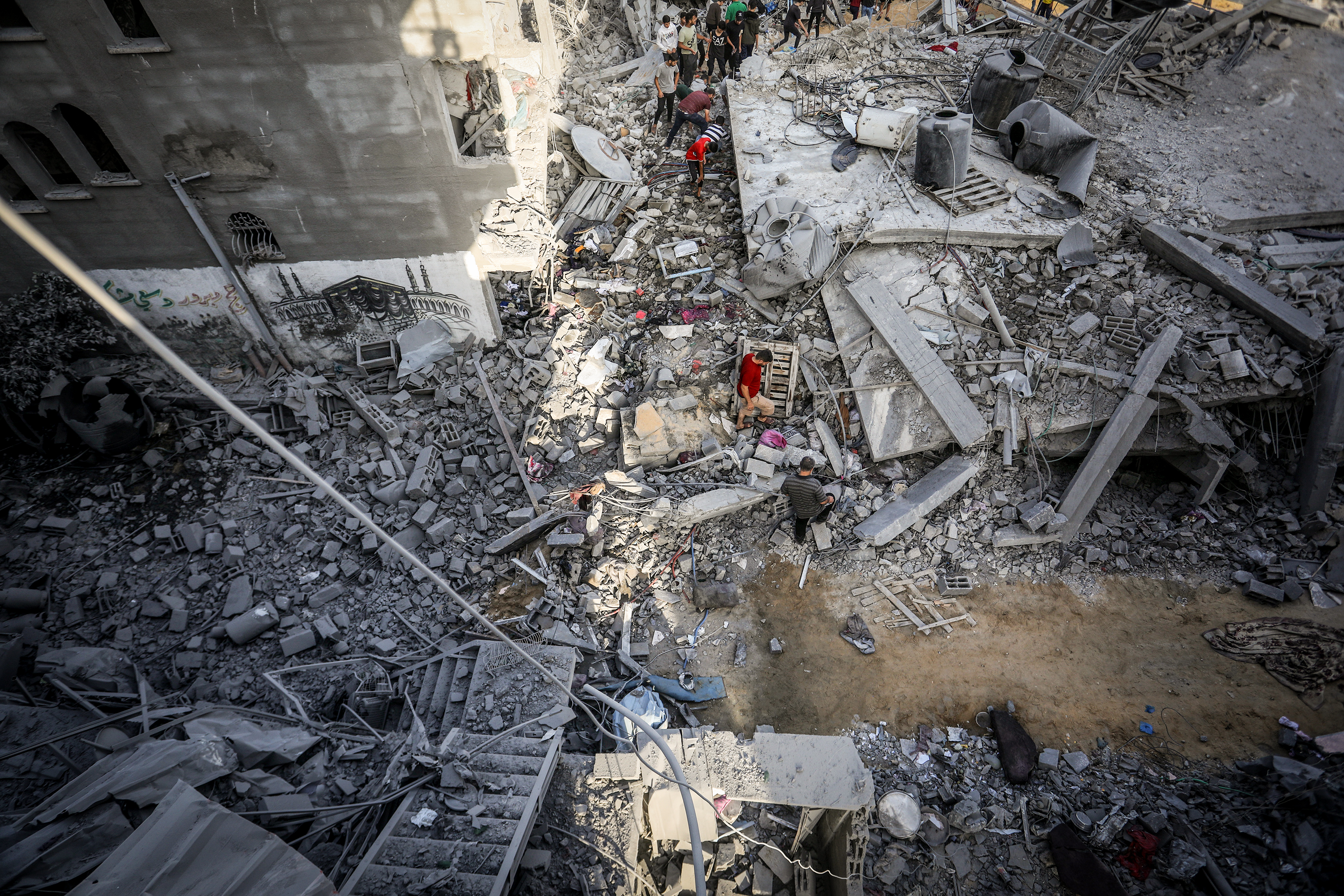Legal Expert Explains: "One Thing Israel Must Beware of in Gaza"
Professor Avi Bell outlines Israel's appropriate response to Hamas's cynical use of civilians and suggests actions against hospitals turned into terrorist headquarters.
 In the circle: Prof. Avi Bell (Background photo: IDF Spokesperson)
In the circle: Prof. Avi Bell (Background photo: IDF Spokesperson)This is the make-or-break issue in the context of the difficult conflict in Gaza: international legitimacy for Israel to fight what Prime Minister Benjamin Netanyahu called the largest terrorist base in history. For this, we turn to Professor Avi Bell from Bar-Ilan University and the Kohelet Forum, who outlines the correct response to terrorists in Gaza.
"Sites in Gaza that are used for terrorism can be attacked as long as the harm to non-combatants is not excessive relative to the military need," Bell explains. "To understand what is excessive and what is not, one must examine actions taken by law-abiding countries in various places, such as the U.S.'s campaigns in Afghanistan and Iraq."
Is Israel acting more morally than the American army?
"Based on the numbers we receive," Bell responds, "the Americans killed many more civilians in Iraq than the IDF has killed in recent years. The same holds true for Afghanistan and the Russians in Ukraine. The number of non-combatants killed in Gaza, according to IDF reports, is much smaller than those killed by other armies. This indicates that not only do we comply with international law, but we also impose stricter standards on ourselves for the residents of Gaza at the expense of our soldiers."
 (Photo: Abed Rahim Khatib / Flash90)
(Photo: Abed Rahim Khatib / Flash90)Was the challenge faced by the Americans similar to the one faced by Israel?
"Indeed. Terrorist organizations like the Taliban and ISIS display the same disregard for law as Hamas. These terrorist organizations do not respect any international or moral standard. They behave like barbarians and are willing to use human shields. In fighting against them, significant force must be applied. The U.S. acted accordingly against these terrorists, without kid gloves. This still adheres to the law that allows the use of force, and allows it even when there is certainty that civilians will be harmed."
If we delve into the details, what is the basis of international law?
"In fact, international law regarding war is vague and lacking, whether it pertains to counter-terrorism or regular military conflicts. Most relevant laws are not written at all but are part of what is called customary law. The definition of a legal custom is what is typically done—what other countries do under the understanding that this action conforms to the law.
And how is it determined what the customary practices of world countries are?
"This is precisely the issue: for a practice to be customary, the same behavior must be exhibited by more than one country. Thus, the claim made in the past that Israel supposedly wrote the laws of warfare in terrorism due to the IDF's careful conduct against terrorists has no basis. Customary law cannot rely solely on one country's practices. Such a possibility does not exist. And if there is a prohibition under the law, then, of course, it is prohibited to undertake it. In our case, where there is no prohibition against fighting terrorists even with broad impact, it means that it is permitted according to international law."
A Hospital for Terrorists
Reports from journalists inside the strip speak of entire areas reduced to rubble. Is there justification for this under international law?
"Building destruction is possible under international law, to the extent that it is permissible to attack anything that serves Hamas, although we know that we also destroy non-combatant structures along the way. Here, too, it is vital to understand that this destruction is permissible as long as incidental damage is not considered excessive. Given the circumstances of Israel's activities in Gaza, which involve fighting a terrorist organization present everywhere, above and below ground, widespread destruction of the strip's buildings is expected. There is no alternative reality. If we track other combat events around the world, like the fight against ISIS in the city of Fallujah, Iraq, this was the exact situation there. By the end of the war, the city became a ghost town unsuitable for human habitation for a long time afterward."
 (Photo: Abed Rahim Khatib / Flash90)
(Photo: Abed Rahim Khatib / Flash90)While we are talking, the IDF is surrounding the Rantisi, Indonesian, and Shifa hospitals in Gaza. These have become full-fledged terrorist bases, with hospitalized patients as well. How can this situation be tackled?
"Shifa is a challenge for Israel," Bell says. "It is important to note that to the extent it serves Hamas, the structure is a military target that can be destroyed. The legality of an attack on a hospital depends on the situation's circumstances, as there is a risk that incidental harm to civilians and equipment not serving Hamas will be considered excessive. Therefore, the defense system must create conditions allowing such an attack, like evacuating non-combatants from the area, and more." It appears Israel is in the midst of this effort.
Is Israel's caution worthwhile in the end? Meaning, is the world attacking us less because of it?
"I believe Israel makes a mistake when it sometimes interprets the law in a way that unnecessarily restrains its actions against terrorists. It's a mistake to think that if we are harder on ourselves, the world will treat us fairly. Of course, there is benefit in respecting the law, but being stricter with ourselves beyond that—will not help us."
Regarding Israel's legal situation globally, the most problematic focal point for Israel is probably the International Criminal Court in The Hague. "One must understand that this court didn't just appear out of thin air," Bell explains. "Its authority comes from an agreement reached between countries, allowing the court to judge them. Thus, the court in The Hague is exactly like an arbitration institution, in which two litigants approach an arbitrator to mediate between them. Israel did not join this arbitration institution, for good reasons, and therefore it has no authority to judge Israel."
So what drives the court's decisions to judge Israel?
"The court's prosecutors, along with the Palestinians, concocted an excuse to try Israelis even though, as mentioned, the court lacks authority to do so by law. The Palestinians called themselves a state and claimed they joined the court's treaty, also claiming that the West Bank, Gaza Strip, and East Jerusalem are territories of the State of Palestine. All this leads the court to allow itself to judge what happens here.
"The court knew no Palestinian state exists but decided it has the authority to prosecute Israeli defendants. This proves the court does not act according to the law but based on political considerations," Bell concludes.
What damage is the court capable of doing to us?
"The damage the court can do to Israel is significant, and will increase the more we subject ourselves to it," Bell clarifies. "The damage could align with the nature of the court's activity, which acts against individuals rather than states. Thus, it could decide that state leaders or field soldiers have supposedly committed war crimes, making them wanted for arrest. In such a case, the court cannot exert authority within Israel, of course, but it means that the person concerned will barely be able to leave the country, as he or she could be apprehended and extradited to the court in nearly any location.
"More than a hundred countries worldwide are members of the court, so it is an institution with a fairly wide reach. In such a case, the only way to leave the country is through a prior agreement with the intended destination country. I personally would not trust anyone if such an arrest warrant were facing me."

